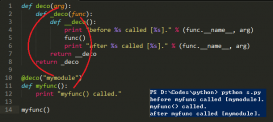坑1 : 動態主機清單配置,需要按照ansible的要求的格式返回給ansible命令的
源代碼如下:
但是在ansible-playbook中使用動態主機配置文件的時候,發生了錯誤!!!

提示沒有匹配的主機信息
分析: 數據庫已配置好,python腳本也能輸出,問題在于輸出的結果不是ansible想要的格式作為ansible的命令輸入,因此排查如下
下面看下我的動態inventory輸出的格式吧
|
1
2
3
4
5
6
7
8
9
10
11
12
|
[root@ansible fang]# python ansible_inventory.py --list{ "all": [ "192.168.10.104" ]}[root@ansible fang]# python ansible_inventory.py --host 192.168.10.104{ "ansible_ssh_host": "192.168.10.104", "ansible_ssh_user": "root", "hostname": "clone-node1"} |
在網上找的方法,雖然實現了—list --host的輸出,但是格式不滿足ansible格式輸出的要求,ansible需求的格式有哪些呢,請看解決辦法中….
輸出結果:
這是出錯的信息,提示還是找不到主機的信息
[root@ansible fang]#
ansible-playbook -i ansible_inventory.py bb.yml運行出錯
解決方法:
先說個知識點(ansible所要求的格式):
動態 Inventory 指通過外部腳本獲取主機列表,并按照 ansible 所要求的格式返回給 ansilbe 命令的
因此,需要清楚ansible需要那種inventory的格式呢
必須輸出為 JSON 格式
同時必須支持兩個參數:--list 和 --host <hostname>。
--list:用于返回所有的主機組信息,每個組所包含的主機列表 hosts、所含子組列表 children、主機組變量列表 vars 都應該是字典形式的,_meta 用來存放主機變量。
正確的輸出格式是什么樣子的呢,請看下面:
以下的是正確的動態inventory的輸出格式,其中就是ansible的第三點要求 每個組所包含的主機列表 hosts、所含子組列表 children、主機組變量列表 vars 都應該是字典形式的,_meta 用來存放主機變量。
|
1
2
3
4
5
6
7
8
9
10
11
12
13
14
15
16
17
18
19
20
|
[root@ansible fang]# vim tt.py[root@ansible fang]# python tt.py{ "group1": { "hosts": [ "192.168.10.104" ] }, "group2": { "hosts": [ "192.168.10.103", "192.168.13.5" ], "vars": { "ansible_ssh_port": 22, "ansible_connection": "ssh" } }}[root@ansible fang]# |
按照以上的格式,來編寫我們的輸出吧,
SQL表格內容如下:

我想要輸出的json格式是這樣的
|
1
2
3
4
5
6
7
8
9
|
{組名:{hosts:[‘ip1','ip2'],vars:{ “ansible_ssh_port”:22,“ansilble_connection”:'ssh'……….}}} |
腳本代碼列出來了如下:
|
1
2
3
4
5
6
7
8
9
10
11
12
13
14
15
16
17
18
19
20
21
22
23
24
25
26
27
28
29
30
31
32
33
34
35
36
37
38
39
40
41
42
43
44
45
46
47
48
49
50
51
52
53
54
55
56
57
58
59
60
61
62
63
64
65
66
67
68
69
70
71
|
#_*_coding:utf-8_*___author__ = 'fang'import pymysqlimport jsonimport argparseimport sysdef execude_sql(table): #定義一個執行SQL的函數 sql = 'select * from {0};'.format(table) cur.execute(sql) #args即要傳入SQL的參數 sys_result = cur.fetchall() #index = cur.description hostlist = {}#放入主機清單的信息 for i in sys_result: hostlist[i[2]] = [] for i in sys_result: hostlist[i[2]].append([i[1], i[5], i[6]]) host_lists = dict() for i in hostlist.iteritems(): dict_item = dict() for index in i[1]: dict_item[index[0]] = {'ansible_connection': index[1], 'ansible_ssh_port': index[2]} host_lists[i[0]] = dict_item # print json.dumps(host_lists, indent=4)return host_listsdef group(data): ''' all hostip :param data: :return: ''' count_ip = dict() count_ip['all'] = {} count_ip['all']['hosts'] = [] index = [] for i in data: index.extend(data[i].keys()) count_ip['all']['hosts'].extend(list(set(index))) print json.dumps(count_ip, indent=4)def host(data, ip): dict_host = {} for i in data: if data[i].keys() == [ip]: dict_host[i] = {} dict_host[i]['hosts'] = [ip] dict_host[i]['vars'] = data[i][ip] print json.dumps(dict_host, indent=4) breakif __name__ == "__main__": global file, con, cur #文件對象,連接和游標對象 #連接數據庫 con = pymysql.connect('127.0.0.1', 'root', '', 'ansible', charset='utf8') # 連接數據庫 cur = con.cursor() # 定義一個游標 data = execude_sql('hosts_table')# parser = argparse.ArgumentParser()#定義參數解析器#獲取參數的方法1:#以下是參數解析器添加參數格式,有—list和—host dest表示都可以通過args.list或者args.host來獲取到可變參數的值,action中store_true表存儲的是布爾值,當沒有—list的時候默認false,當有—list的時候,但是沒有值,默認則為true,help表示幫助時候提示的信息,argparse很好用,在這里恰當好處 # parser.add_argument('--list',action='store_true',dest='list',help='get all hosts') # parser.add_argument('--host',action='store',dest='host',help='get sigle host') # args = parser.parse_args() # if args.list: # group(data) # if args.host: # host(data, args.host)#獲取參數的方法2: if len(sys.argv) == 2 and (sys.argv[1] == '--list'): group(data) elif len(sys.argv) == 3 and (sys.argv[1] == '--host'): host(data, sys.argv[2]) else: print "Usage %s --list or --host <hostname>"% sys.argv[0] sys.exit(1) |
坑 2: 動態inventory腳本要制定python的解釋器,否則無法執行
問題分析:
Ansible-playbook –I ansbile_inventory.py bb.yml執行
提示:無法識別host,還是出現了問題
對比ansible要求的格式,沒有差別,最后進行代碼的比對,問題出現在腳本沒有制定Python解釋器,導致出現的問題
解決辦法:
添加python解釋器的路徑

執行結果:
Yml文件

命令執行結果:
|
1
2
3
4
5
6
7
8
9
10
11
12
13
14
15
16
17
18
19
20
21
22
23
24
25
26
|
[root@ansible fang]# ansible-playbook -i ansible_inventory.py bb.ymlPLAY [192.168.10.104] *********************************************************************TASK [debug] *********************************************************************ok: [192.168.10.104] => { "msg": "this is test block"}TASK [file] *********************************************************************ok: [192.168.10.104]TASK [debug] *********************************************************************ok: [192.168.10.104] => { "msg": "this is always"}PLAY RECAP *********************************************************************192.168.10.104 : ok=3 changed=0 unreachable=0 failed=0[root@ansible fang]# python ansible_inventory.py --host 192.168.10.104{ "xiaoming": { "hosts": [ "192.168.10.104" ], "vars": { "ansible_ssh_port": 22, "ansible_connection": "ssh" } }} |
另外注意點: --list --host 正是通過yml中的hosts指定的內容,即為腳本中命令行的參數的內容
總結
以上所述是小編給大家介紹的ansible動態Inventory主機清單配置遇到的坑,希望對大家有所幫助,如果大家有任何疑問請給我留言,小編會及時回復大家的。在此也非常感謝大家對服務器之家網站的支持!
如果你覺得本文對你有幫助,歡迎轉載,煩請注明出處,謝謝!
原文鏈接:https://www.cnblogs.com/chaolumeng/p/ansible01.html












